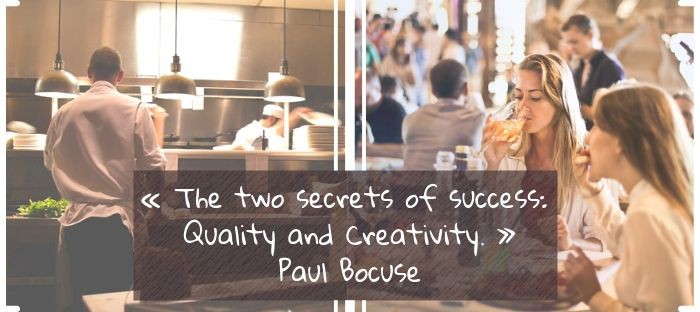How food suppliers innovate to meet the needs of the catering sector
By Astrée Dumas
Catering is a very competitive sector, and if meeting the customers’ expectations is an absolute must to stay in the market, exceeding them became an objective to fulfill. Due to the uniqueness of every restaurant and customer, there is no miracle recipe, but I wanted to share a perspective I have from my experiences in the catering and marketing sectors.
As a waitress in a restaurant, I noticed that most of the clients´ expectations and feedbacks are based on the visual of the dishes, the tasting sensations provided and the service quality. On the basis of these criteria, the customers will appreciate the experience, come back and maybe even recommend it, depending on how they found the value for money. If the price is a static element, quality is very personal and its valuation can change from one person to another, for this reason creating a restaurant identity with its own specialties is a prerequisite for its sustainability when its strategy is based on the differentiation.
From this observation, creating dishes that bring novelty using avant-garde products is a major concern for chefs, therefore restaurants seek sophisticated products to incorporate them into their dishes. With the aim of meeting these needs which are in constant motion, suppliers of premium products must innovate. Creating derived products gives the opportunity to a restaurant chef to innovate his dishes, without necessarily changing the restaurant menu. Molecular cuisine is a perfect example since it adds an elegant touch to the dishes, without denaturing its taste.
Food suppliers can help the restaurants carry their projects out offering the most suitable products, and nowadays, following the trends to know what they need gets easier thanks to social networks like Instagram and Linkedin. The closeness they bring makes it possible to be aware of the current expectations, following restaurateurs and reading what chefs share.
As a result, a company whose main activity is to supply restaurants and hotels must be committed to a continuous improvement process, and this is what I had the opportunity to experience within the OliveClub company through the launching of a new product. Specialists in premium extra virgin olive oils, they combined tradition and modernity to give rise to extra virgin olive oil pearls. The aim of this product is to give chefs the opportunity to improve 3 key elements in their dishes: the presentation of the plate, the sensation in the mouth and the taste.
Olive oil pearls are just an example of product innovation of a food supplier, and with the aim of offering the right products at the right place at the right time, more and more companies of this sector tend to set up strategic monitoring, using several different tools like social networks.
Finally, these tools used by the food suppliers help meeting the needs of the restaurants, and when it comes to selling the new products, the chefs are best placed to know if they will be a success and how to make use of them the best in their menu. Their creativity is wonderful, sometimes surprising, and the products come to live only once they are tested and used by the restaurant chefs.
- Publicado en 2019-12-13 13:25:47





